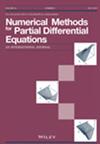基于通量的 HDG 方法
IF 1.7
3区 数学
Q1 MATHEMATICS, APPLIED
引用次数: 0
摘要
本文针对稳态扩散问题提出了基于通量的可杂化非连续伽勒金(HDG)方法,并通过让稳定参数趋于无穷大提出了一种新方法。假设存在 inf-sup 条件,我们证明了该方法的拟合优度和最优阶误差估计。我们证明了一些三角形元素满足 inf-sup 条件。我们还提供了数值结果来支持我们的理论结果。本文章由计算机程序翻译,如有差异,请以英文原文为准。
A flux‐based HDG method
In this article, we present a flux‐based formulation of the hybridizable discontinuous Galerkin (HDG) method for steady‐state diffusion problems and propose a new method derived by letting a stabilization parameter tend to infinity. Assuming an inf‐sup condition, we prove its well‐posedness and error estimates of optimal order. We show that the inf‐sup condition is satisfied by some triangular elements. Numerical results are also provided to support our theoretical results.
求助全文
通过发布文献求助,成功后即可免费获取论文全文。
去求助
来源期刊
CiteScore
7.20
自引率
2.60%
发文量
81
审稿时长
9 months
期刊介绍:
An international journal that aims to cover research into the development and analysis of new methods for the numerical solution of partial differential equations, it is intended that it be readily readable by and directed to a broad spectrum of researchers into numerical methods for partial differential equations throughout science and engineering. The numerical methods and techniques themselves are emphasized rather than the specific applications. The Journal seeks to be interdisciplinary, while retaining the common thread of applied numerical analysis.

 求助内容:
求助内容: 应助结果提醒方式:
应助结果提醒方式:


